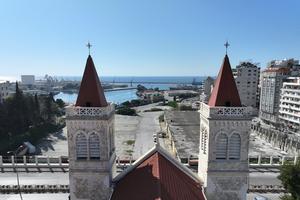Lawyer’s Heart Surgery Leads Him on ‘Different Path’ to Serve Persecuted Christians
The photographs of Stephen Rasche in a new exhibit highlight the horrors suffered in Iraq and Nigeria.

In June 2014, Islamic State militants took over the northern Iraqi city of Mosul, and within days, half a million people had fled the city, including more than 150,000 Iraqi Christians.
By August, ISIS fighters had fanned out across the Nineveh Plains and forced Christians to flee the villages inhabited by their ancestors since the first-century AD.
At the same time, some 5,500 miles away in Maine, Stephen Rasche, an international transactions lawyer, was recuperating from open-heart surgery — and doing some serious soul-searching.
“I had a long time after that to really think about what is it that I was doing. And, most importantly, where was I in my faith?” he said last week. “It became pretty clear to me that in the productive time that I had left on this Earth that I needed to change my ways and go down a different path.”
That path would eventually lead him to Iraq, where he would dedicate the next five years to serving Christians there. The photographs he took in the course of his work are featured in a new exhibit titled “Among the Persecuted and Displaced,” at the Blessed Michael McGivney Pilgrimage Center, in New Haven, Connecticut. The exhibit, which is sponsored by the Knights of Columbus, also includes portraits of persecuted Christians Rasche met in Nigeria.
Rasche told the Register that when he heard the news of ISIS’ takeover of Mosul, his first thought was of the people he knew there — those he had met while doing some pro bono work for the Catholic Church, from the very villages and towns that were now occupied by ISIS.
“It was horrifying, just as it was for everybody else — with the exception that they were people that I knew,” he said. It wasn’t long before he heard from some of the Christians he had known there.
“My friends in the Christian community reached out to me right away and said, ‘Look, Steve, if ever you were going to help the Christians here in Iraq, now would be the time,’” he recalled.
That November, as ISIS continued to seize territory, he made his way to Iraq, with the intention of assisting in what he thought would be a “removal operation” to help Iraqi Christians leave the country as quickly as possible.
When he met with Archbishop Bashar Warda of Erbil, Rasche was surprised to learn from the Chaldean Catholic prelate that the Christians there had no intention of leaving. As a matter of fact, the archbishop said, he had big plans and could use the American lawyer’s help.
“The long and the short of it was I agreed to stay and wrapped up my commercial practice over the coming six months. Over that next year, I became just fully embedded with the Church,” Rasche told the Register.
Once embarked on that “different path” he had dreamed of as he recovered from heart surgery, he has never looked back. In 2019, Rasche began carrying out similar work in Nigeria with Christians persecuted by Boko Haram and he returns to Iraq frequently under the auspices of the Institute for Catholic Humanitarian Service, based at Franciscan University at Steubenville, Ohio.
During the ISIS war in Iraq, Rasche worked shoulder to shoulder with Archbishop Warda to serve Christians in Iraq by improving conditions so they would not be compelled to leave their homeland. And with the help of major donors, including the Knights of Columbus and Aid to the Church in Need, they provided food and housing to more than 13,000 families of displaced Christians from Nineveh and opened several schools for their children. In 2015, they founded a hospital as well as the Catholic University of Erbil, which, on the eve of its 10th anniversary, has an enrollment of 1,000 students.
“Opening schools, opening a hospital, opening a university, they are all part of the same effort — all under the archdiocese — to give the remaining Christians there in Iraq some hope to stay,” Rasche told the Register.
As the U.S.-led coalition forces began liberating towns from ISIS, Rasche, and a small group of priests traveled from town to make a record of what Church property remained and what had been looted or desecrated. As part of these missions, Rasche took photos of the displaced Christians he encountered — to document what had happened to them as well.
In remarks he made at the opening of the exhibit, Rasche said that while he initially took photos to document what had happened, he came to realize that the portraits told a story that he wanted to share.
“Over time, as the catalog grew and I began to look at them, you would see in the faces this real pattern of the inherent dignity of the human person, regardless of the situation,” Rasche said. “That really became true, even as I moved this work to Nigeria. We would see these people in just these awful situations. They’d lost everything. They’d been displaced. They’d been terrorized.”
He added, “It became clear to me that this might be a good way to show people what was taking place so people could understand and have some way of sharing in solidarity with them.”
Rasche has kindly given the Register permission to publish some of the photos from the exhibit, along with his reflections (see below).






LEARN MORE
Exhibit: “Among the Persecuted and Displaced”
Where: Blessed Michael McGivney Center, New Haven, CT
When: Through Sept. 7, 2025
Hours: Wednesday-Sunday, from 10 a.m. to 4 p.m.
Price: There is no admission fee. Free parking is available to visitors in the lot beneath the building. For further information, visit the Blessed Michael McGivney Pilgrimage Center’s website.
















